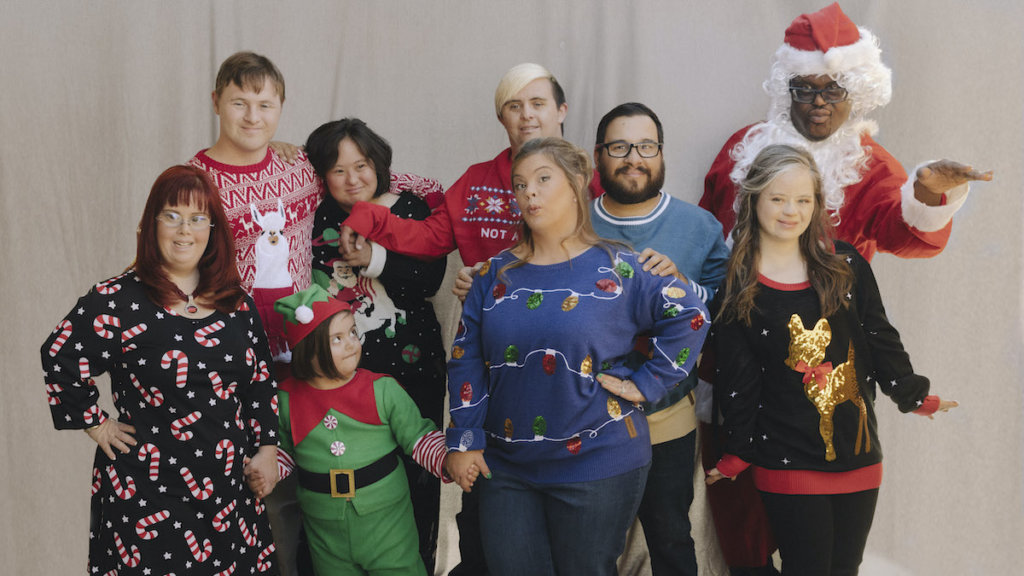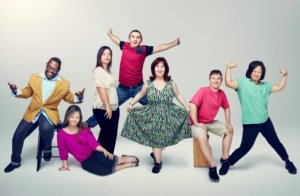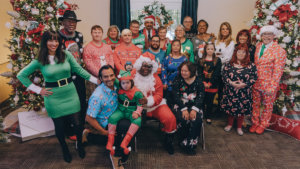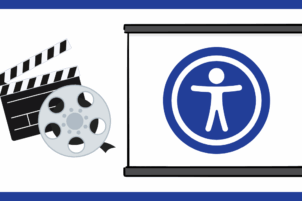Los Angeles, Dec. 17 – After four seasons, the multiple-Emmy Award-winning A&E docuseries Born This Way will conclude with a holiday special on Wednesday evening. Ahead of the finale, Good Morning America will be featuring a segment on Born This Way Wednesday in the 8:00 a.m. hour.
What people view on television influences how they feel and believe, leading to how they act. And shows like Bunim/Murray Productions’ Born This Way, which follows the lives of seven diverse young adults with Down syndrome as they seek to build independent lives, launch their careers and form lasting friendships, breaks down stigmas surrounding interacting with people with disabilities.
Born this Way, whose audience quickly grew to 1 million viewers in the first season, with 40 percent of those viewers being new to the A&E Network, showed that including disability is profitable. After all, the disability market is valued by Nielsen to be more than one trillion dollars.
Even so, people with disabilities are by far the least represented marginalized community in popular media. One-in-four adults in America have some form of physical, cognitive, sensory, mental health or other disability. Yet, just three percent of all characters portrayed on television are disabled — and only five percent of those characters are authentically represented by actors with disabilities.
“Inclusion of characters – and actors – with disabilities – must be an intentional effort; it will not happen by accident,” said Lauren Appelbaum, who leads RespectAbility’s Hollywood Inclusion efforts as the organization’s Vice President of Communications and author of The Hollywood Disability Inclusion Toolkit. “The entertainment industry has an opportunity to help remove the stigmas that currently exist around interacting with individuals who have disabilities. Seeing actors with disabilities on screen goes a long way in helping to remove these stigmas.”
Born This Way is a breakthrough show that is changing the disability lens from a “hand out” to a “hand up.”
Only one-in-three working-age people with disabilities have a job. However, studies show that most people with disabilities want to work. The numbers are even worse for people with Down syndrome. However, the Harvard Business Review, Fast Company, Wired and other publications have extolled the “disability-advantage” to companies that hire talent that includes people with disabilities.
In 2017, the latest statistic that exists, 27.8 percent of people with cognitive disabilities, which includes Down Syndrome, had jobs. This is up 2.3 percent from 2015 when only 25.5 percent of people with cognitive disabilities had jobs. Over the past two years, 225,696 people with cognitive disabilities have entered the American workforce.
“Each year 300,000 young people with disabilities reach the age to enter the workforce. Since what we see on screen influences how we act in real life, the authentic representation of young adults with disabilities working, living independently and getting married, just like everyone else, on Born This Way played a part in this employment growth,” Appelbaum added.
Several cast members, including Sean McElwee and Megan Bomgaars, created their own businesses. With such a low employment rate for people with disabilities (just 33 percent nationally), many people with disabilities find their best option for employment is starting their own business. According to the U.S. Census Bureau, one in 10 employed people with disabilities are self-employed.
Earlier this month, Sean McElwee also brought his onscreen stardom to Capitol Hill to deliver a powerful message about entrepreneurship and jobseekers with disabilities. McElwee spoke about his personal “mission to show the world that people with Down syndrome can have a business and give back.”
A Focus on Diverse Casting
Show creator Jonathan Murray, the innovator behind the first-ever reality-show, The Real World, and many other hit shows including Keeping Up with the Kardashians, said the cast members of Born This Way remind all of us that, “every individual has something to contribute.”
“In thinking about the show, we wanted to focus on the ability within the disability and I think that is what is exciting to see,” said Murray. “We also are very proud of the fact that our cast is very diverse. Born This Way has a cast that includes people who are African American, Hispanic and Asian. This is a breakthrough for those minority communities as well.”
The inclusion of John Tucker, who is African American, Elena Ashmore, whose mother is from Japan and whose storyline includes the immigrant experience, and Cristina Sanz, who is a Hispanic woman, is important for several reasons. One is that when disability is depicted in pop culture, it tends to be all white. Real story telling requires exploring people with multiple minority status (i.e. African American + disability).
Secondly, far too many African Americans and Hispanics/Latinos in America who have a developmental disability are not receiving the diagnosis, school accommodations and high expectations they need to succeed. Today only 65 percent of students with disabilities graduate high school and only seven percent complete college. In addition, there are 750,000 people with disabilities behind bars in America – and the majority of them are people of color.
“Everyone experiences powerful stories,” Sasha Alpert said after she and Megan Sleeper won the first-ever Emmy Award for Outstanding Casting for a Reality Program for Born This Way in 2017. “By not including a diverse group of people, we are limiting our ability to tell compelling stories. If we make television that doesn’t embrace the various populations around us, we limit the narratives we tell.”
Murray added that shows like Born This Way and more diversity in Hollywood are good business.
“Hollywood has been really, really slow to recognize the diversity of this country,” he said. “I think it is catching up fast now. And I think it’s realizing that diversity is good business. I don’t think it’s necessarily because it is altruistic. I think they are recognizing that TV shows will do better if they reflect what the country is.”
Using Their Platform to Destigmatize Down syndrome
Over four seasons, Born This Way has received 13 nominations and three wins including the Emmy for Outstanding Unstructured Reality Series in 2016, and for Casting for a Reality Program and Cinematography for a Reality Program in 2017.
Shortly after the premiere of the show, producers heard from a woman who, on receiving a prenatal diagnosis of Down syndrome, was encouraged by her OB-GYN to terminate her pregnancy. Watching Born This Way helped her see a bright future for her new family, and she decided to bring her baby to term.
“[Born This Way] tells our stories, our dreams,” cast member Cristina Sanz said. “People can see that our lives are most of the time very typical. People with disabilities have jobs, fall in love, have businesses and enjoy time with friends.”
Born This Way also has paved the way for more shows and films with authentic disability representation, such as this year’s The Peanut Butter Falcon, which stars Zack Gottsagen, a young man with Down syndrome. This film, which has generated significant Oscar buzz, has grossed more than $20 million.
Murray hopes that Born This Way has a lasting impact on the culture of television.
“What I would like to see is that more shows have a diversity to them where the diversity is not the point of the show,” Murray said. “I’d like to get beyond the labels to accurately reflect what is going on in our country today.”
RespectAbility, a nonprofit organization fighting stigmas and advancing opportunities so people with disabilities can participate fully in all aspects of society, has been honored to consult during the creation of Born This Way and congratulates the entire team for its hard work.
Jennifer Laszlo Mizrahi, RespectAbility’s president who herself has a disability, and who knows what it means to raise a child with multiple disabilities, said: “For generations TV-viewers saw people with disabilities through the lens of the Jerry Lewis telethon. Though it was well intended, it showed people’s inabilities and used a lens of pity. Born This Way is empowering and uplifting. It shows, as one member of the cast frequently says, that the public should not ‘Limit me.’”
“A Very Born This Way Christmas,” premieres on Wednesday, Dec. 18, 2019 at 9:00 p.m. ET/PT on A&E. The special will celebrate the spirit of the holidays as Elena, John, Megan, Rachel, Sean, Steven, Cristina and Angel and their families gather to spread cheer and reflect on their personal growth across the four seasons of the series.
Ahead of this premiere, A&E released six all-new digital shorts, Born This Way: Moving Forward, on Friday, Dec. 13. Across the digital episodes, the cast tackled important topics such as advice for families who have a loved one with Down syndrome, entrepreneurship within the disability community, a sibling’s take on having a brother or sister with a disability, and the importance of people with disabilities participating in the democratic process. Episodes also explored how the series came to be, and its impact on the Down syndrome community. The digital series aired on A&E’s YouTube Channel and on the Born This Way Facebook page. In addition, all episodes of the four seasons of Born This Way are available online, free for all: www.aetv.com/shows/born-this-way.










